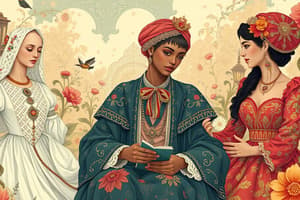Podcast
Questions and Answers
Which of the following roles do women NOT typically serve as changemakers?
Which of the following roles do women NOT typically serve as changemakers?
- Participants in economic development
- Perpetuators of gender bias (correct)
- Leaders in scientific breakthroughs
- Advocates for social justice
Women have historically faced societal support and recognition as changemakers.
Women have historically faced societal support and recognition as changemakers.
False (B)
Name a contemporary issue that women are addressing as changemakers.
Name a contemporary issue that women are addressing as changemakers.
Climate change
Women have played crucial roles in social movements, advocating for ___________ and challenging norms.
Women have played crucial roles in social movements, advocating for ___________ and challenging norms.
Match the following sectors with their description of women's impact:
Match the following sectors with their description of women's impact:
What is a barrier that can affect women's roles as changemakers?
What is a barrier that can affect women's roles as changemakers?
Cultural contexts and socioeconomic factors have no impact on women's experiences as changemakers.
Cultural contexts and socioeconomic factors have no impact on women's experiences as changemakers.
What can foster inclusive change and empower women?
What can foster inclusive change and empower women?
Flashcards
Women as Changemakers
Women as Changemakers
Women have consistently played significant roles in driving change across various societies throughout history, impacting social, economic, and political spheres.
Early Examples of Women as Changemakers
Early Examples of Women as Changemakers
Early examples include suffragists who fought for women's voting rights, abolitionists who worked to end slavery, and women who advocated for better healthcare and economic opportunities. These women faced societal resistance and discrimination.
Women's Impact on Social Change
Women's Impact on Social Change
Women have profoundly impacted social attitudes and norms regarding gender roles, equality, and human rights. Their contributions have shaped societies into more inclusive spaces.
Women's Impact on Economic Change
Women's Impact on Economic Change
Signup and view all the flashcards
Women's Impact on Political Change
Women's Impact on Political Change
Signup and view all the flashcards
Contemporary Women Changemakers
Contemporary Women Changemakers
Signup and view all the flashcards
Barriers and Challenges for Women Changemakers
Barriers and Challenges for Women Changemakers
Signup and view all the flashcards
Fostering Inclusive Change
Fostering Inclusive Change
Signup and view all the flashcards
Study Notes
Introduction to Women as Changemakers
- Women have consistently been agents of change across various societies and throughout history.
- Their contributions have been often overlooked or underappreciated.
- Their roles in social, economic, and political spheres have significantly influenced progress.
Early Examples of Women as Changemakers
- Women have played crucial roles in social movements, advocating for rights, challenging norms, and inspiring change.
- Examples include suffragists, abolitionists, and women advocating for economic opportunities and healthcare improvements.
- Early pioneers faced significant societal opposition and discrimination.
Impact on Different Sectors
- Social Change: Women have been instrumental in shaping social attitudes and norms, particularly regarding gender roles, equality, and human rights.
- Economic Change: Women's entrepreneurship and involvement in the workforce have altered economic landscapes, generating new opportunities and challenging traditional economic models.
- Political Change: Women's participation in politics has brought about significant shifts, promoting greater representation and advocating for policies that benefit society as a whole.
Contemporary Examples of Women as Changemakers
- Women are tackling global challenges such as climate change, poverty, and inequality.
- This includes scientific breakthroughs, environmental activism, and advocacy for social justice.
- Many contemporary women leaders are working towards a more equitable and inclusive future.
Global Perspectives
- Women's experiences and roles as changemakers vary across cultures and regions.
- Cultural contexts, socioeconomic factors, and political systems influence their contributions.
- Recognizing and supporting women in diverse settings is crucial for fostering impactful change.
Barriers and Challenges
- Societal expectations and gender bias can restrict women from fully realizing their potential.
- Access to education, resources, and opportunities often differs between genders.
- Systemic discrimination can impede progress and limit women's roles as changemakers.
Fostering Inclusive Change
- Supporting women's empowerment initiatives can promote positive societal transformation.
- Promoting education and equal opportunities for women will advance inclusivity and impact change.
- Encouraging leadership and active participation of women in all sectors can lead to greater progress.
Conclusion
- Women have consistently been powerful agents of change, driving advancements in various sectors.
- Continued efforts are needed to support women's empowerment initiatives and overcome existing barriers.
- Recognizing and valuing women's contributions is crucial for achieving a more just and equitable world.
Studying That Suits You
Use AI to generate personalized quizzes and flashcards to suit your learning preferences.




